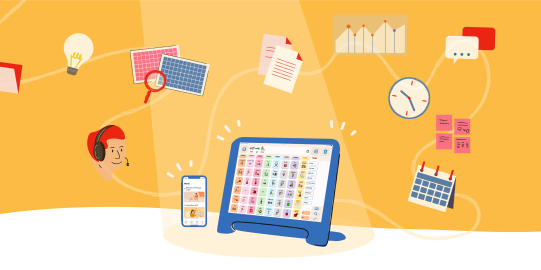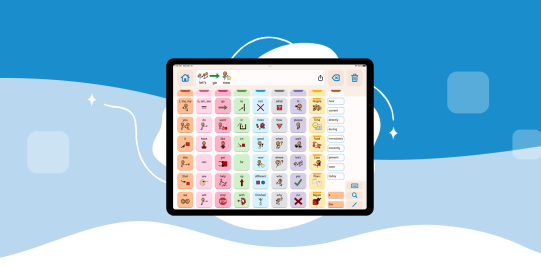Getting started with AAC can be overwhelming, especially for those without previous experience. When developing Proloquo Coach, we wanted to create an app that parents would enjoy using. An app that would be fun and easy to use while providing a sense of accomplishment for its users. To achieve this, we focused on three ideas to bring our plan to life - micro-learning, habit formation, and coaching.
Micro-learning
Micro-learning refers to small and easy to digest pieces of information.
There are no long, academic pieces of text to read in Proloquo Coach. Each article (see an example) focuses on one topic and includes images, embedded videos, and links to keep it fun.
Many families get information about AAC in disconnected bits and pieces. Websites, blogs, memes, online training sessions, handouts from school or private therapists. But there is no order, no sequence.
In Proloquo Coach, we identified the major areas of AAC best practice. Starting at the very beginning with, “What is AAC?” and ending with individual communication functions, like making choices and how to refuse/protest. Each of these major areas of best practice is organized into “books”. Each book includes the same two components: Learn and Practice chapters. One idea per chapter. We present one new idea to learn. Then we guide parents to practice what they have learned.

Habit formation
Parents play a critical role in helping their child pick up and use AAC, but more often than not, they don’t know how to.
With Proloquo Coach, parents are guided to add something new to something they are already doing. We coach them to build new habits that become part of existing routines.
We planned and wrote Proloquo Coach’s Practice chapters to make it easy for families to add on tiny new habits. Parents identify an existing routine, add a tiny new action to that routine, and repeat. They commit by writing it down and sharing it with us.
Here are some examples shared with us:

Proloquo Coach helps parents make space for AAC in their homes and lives. Habits are formed one small step at a time, and if parents fall behind because of a busy day, non-intrusive notifications are there to motivate and guide them. Proloquo Coach celebrates the small successes.
With tiny new actions built into familiar everyday routines, parents discover the joy of new opportunities to connect with their child.
Coaching
Like any good coach, Proloquo Coach is positive, enthusiastic, supportive, and knowledgeable. The app helps parents push past obstacles to become a confident communication partner for their child.
Because support from AssistiveWare’s AAC experts is available around the clock, right there in the app, parents never feel alone on the AAC journey.
Parents can often struggle to get other people around their child on board with AAC. Proloquo Coach provides guidance on including teachers, other family members, private therapists to create a team around the child.
Proloquo Coach addresses the emotional connection between parent and child.
Proloquo Coach recognizes the additional stresses that society may place on AAC families. We share information with parents, so they know to respect and accept all of the ways their child is communicating. Using Proloquo Coach, AAC is integrated into existing multimodal communication occurring naturally within the family.
The focus remains on the communication connection and relationship between parent and child.
References
- Buchem, I., & Hamelmann, H. (2010). Microlearning: a strategy for ongoing professional development. eLearning Papers, 21(7), 1-15.
- Cialdini, R. B., & Cialdini, R. B. (2007). Influence: The psychology of persuasion (Vol. 55, p. 339). New York: Collins.
- Eyal, N. (2014). Hooked: How to build habit-forming products. Penguin.
- Fogg, B. J. (2019). Tiny habits: The small changes that change everything. Eamon Dolan Books.
- Knight, J (2017). The Impact Cycle: What instructional coaches should do to foster powerful improvements in teaching.Thousand Oaks, CA: Corwin.





